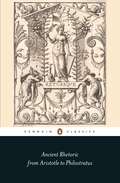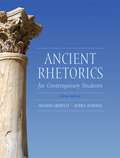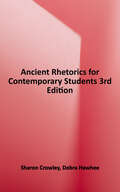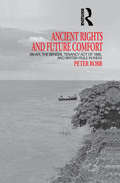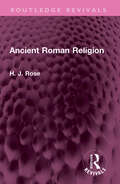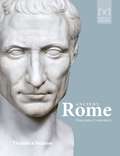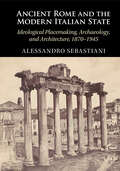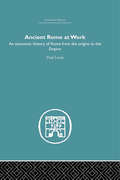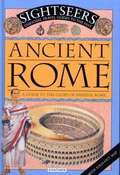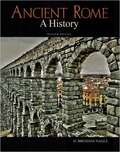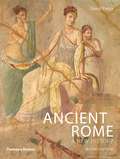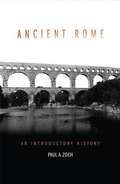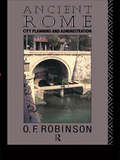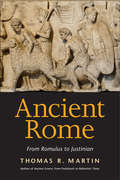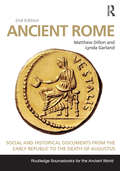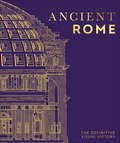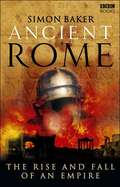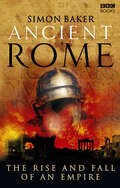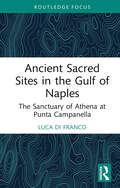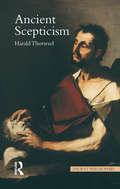- Table View
- List View
Ancient Remedies: Secrets To Healing With Herbs, Essential Oils, Cbd, And The Most Powerful Natural Medicine In History
by Josh AxeLong before the first pharmaceutical companies opened their doors in the 1850s, doctors treated people, not symptoms. And although we've become used to popping pills, Americans have finally had it with the dangerous side effects, addiction and over-prescribing—and they're desperate for an alternative. Here's the good news: That alternative has been here all along in the form of ancient treatments used for eons in traditional Chinese, Ayurvedic and Greek medicine. Ancient Remedies is the first comprehensive layman's guide that will bring together and explain to the masses the very best of these time-tested practices. In Ancient Remedies, Dr. Axe explores the foundational concepts of ancient healing—eating right for your type and living in sync with your circadian clock. Readers will learn how traditional practitioners identified the root cause of each patient's illness, then treated it with medicinal herbs, mushrooms, CBD, essential oils, and restorative mind-body practices. What's more, they'll discover how they can use these ancient treatments themselves to cope with dozens of diseases, from ADHD to diabetes, hypothyroidism, autoimmune disease, and beyond. Through engaging language and accessible explanations, Ancient Remedies teaches readers everything they need to know about getting, and staying, healthy—without toxic, costly synthetic drugs.
Ancient Remedies: Secrets to Healing with Herbs, Essential Oils, CBD, and the Most Powerful Natural Medicine in History
by Dr. Josh AxeBestselling author Dr. Josh Axe explains how to treat more than seventy diseases, lose weight, and increase vitality with traditional healing practices passed down through the ages.Long before the first pharmaceutical companies opened their doors in the 1850s, doctors treated people, not symptoms. And although we've become used to popping pills, Americans have finally had it with the dangerous side effects, addiction and over-prescribing—and they're desperate for an alternative.Here's the good news: That alternative has been here all along in the form of ancient treatments used for eons in traditional Chinese, Ayurvedic and Greek medicine. Ancient Remedies is the first comprehensive layman's guide that will bring together and explain to the masses the very best of these time-tested practices.In Ancient Remedies, Dr. Axe explores the foundational concepts of ancient healing—eating right for your type and living in sync with your circadian clock. Readers will learn how traditional practitioners identified the root cause of each patient's illness, then treated it with medicinal herbs, mushrooms, CBD, essential oils, and restorative mind-body practices. What's more, they'll discover how they can use these ancient treatments themselves to cope with dozens of diseases, from ADHD to diabetes, hypothyroidism, autoimmune disease, and beyond.Through engaging language and accessible explanations, Ancient Remedies teaches readers everything they need to know about getting, and staying, healthy—without toxic, costly synthetic drugs.
Ancient Rhetoric: From Aristotle to Philostratus
by Thomas HabinekClassical rhetoric is one of the earliest versions of what is today known as media studies. It was absolutely crucial to life in the ancient world, whether in the courtroom, the legislature, or on ceremonial occasions, and was described as either the art of the persuasion or the art of speaking well. This anthology brings together all the most important ancient writings on rhetoric, including works by Cicero, Aristotle, Quintilian and Philostratus. Ranging across such themes as memory, persuasion, delivery and style, it provides a fascinating introduction to classical rhetoric and will be an invaluable sourcebook for students of the ancient world.
Ancient Rhetorics for Contemporary Students
by Sharon Crowley Debra HawheeRevives the classical strategies of ancient Greek and Roman rhetoricians and adapts them to the needs of contemporary writers and speakers.
Ancient Rhetorics for Contemporary Students, 3rd Edition
by Sharon Crowley Debra HawheeThis rhetoric revives the classical strategies of ancient Greek and Roman rhetoricians and adapts them to the needs of contemporary writers and speakers. This is a fresh interpretation of the ancient canons of composing: invention, arrangement, style, memory, and delivery. It shows that rhetoric, as it was practiced and taught by the ancients, was an intrinsic part of daily life and of communal discourse about current events. This book gives special emphasis to classic strategies of invention, devoting separate chapters to stasis theory, common and special topics, formal topics, ethos, pathos, extrinsic proofs, and Aristotelian means of reasoning. The authors' engaging discussion and their many contemporary examples of ancient rhetorical principles present rhetoric as a set of flexible, situational practices. This practical history draws the most relevant and useful concepts from ancient rhetoric and discusses, updates, and offers them for use in the contemporary composition classroom.
Ancient Rights and Future Comfort: Bihar, the Bengal Tenancy Act of 1885, and British Rule in India
by Peter RobbThis book analyses the character of British rule in nineteenth-century India, by focusing on the underlying ideas and the practical repercussions of agrarian policy. It argues that the great rent law debate and the Bengal Tenancy Act of 1885 helped constitute a revolution in the effective aims of government and in the colonial ability to interfere in India, but that they did so alongside a continuing weakness of understanding and in effective local control. In particular, the book considers the importance of notions of historical rights and economic progress to the false categorisations made of agrarian structure. It shows that the Tenancy Act helped to widen social disparities in rural Bihar, and to create political interests on the land.
Ancient Roman Religion (Routledge Revivals)
by H. J. RoseFirst published in 1949, Ancient Roman Religion is an introduction to some of the most outstanding features of the complicated religion, or rather series of religions, which flourished in Rome between the earliest recoverable ages of her long history and the close of the classical epoch. This book will be of interest students of religion, literature and history.
Ancient Romans and Their Neighbors: An Activity Guide (Cultures of the Ancient World)
by Simonetta CarrThe ancient Romans lived thousands of years before our time, but they left an indelible influence on our language, buildings, laws, ideas of liberty and citizenship, and much more. Ancient Romans and Their Neighbors will teach children to recognize these enduring marks and to appreciate the rich culture of ancient Rome. But the Romans didn't do it all alone. They learned a lot from their neighbors—fascinating cultures that are more relevant than many imagine. The Etruscans, inhabitants of modern-day Tuscany, created a unique, colorful and highly refined culture, pioneering many elements of architecture, art and fashion that have been attributed to the Romans. The Celts, who have long captured popular imagination with fascinating stories of druids and magic potions, were a complex and resourceful population that left an important mark in much of Europe. The Carthaginians are normally remembered because of Hannibal's daring crossing of the Alps on African elephants, but there is much more to their history and culture, which made them for a time the most powerful force along the Mediterranean Sea. Well-researched and based on the latest findings, this unique comparison of ancient civilizations is also full of engaging activities that will give children a taste of daily life in ancient times.
Ancient Rome (Pocket Museum)
by Anon Virginia CampbellA vast collection of significant works of art from the whole of ancient Greek civilization and a range of museums, gathered in one handy, pocket-sized guide <p><p> The numerous treasures of ancient Greece are scattered all over the world, impossible to view in the context of fellow objects, or in some cases impossible to see at all, without visiting institutions across the globe. This magnificently illustrated book presents more than 200 objects currently housed in public collections around the world that offer both context and immediacy to the rich culture of ancient Greece. From the bifacial hand tools of the Lower Palaeolithic to the Hellenistic Great Altar of Pergamon,the artifacts presented here reveal a complex sociocultural history of shifting priorities, spiritual beliefs, and cultural traditions. Objects from across the Greek world, valued in life and in death, reflect the transmission of shared ideals across vast distances through relationships maintained for centuries at a time. <p> Pocket Museum: Ancient Greece also offers an insight into the history of collecting and methods of interpretation, examining how the perception of objects has changed over time. Beautifully illustrated with photographs of each featured artifact, this is an absorbing introduction to a culture that has exerted an unparalleled influence on Western civilization.
Ancient Rome and the Modern Italian State: Ideological Placemaking, Archaeology, and Architecture, 1870–1945
by Alessandro SebastianiIn this book, Alessandro Sebastiani examines how architecture and urbanism can be used to construct national identity. Using Rome as his case study, he explores how the city was transformed to accommodate different political ideologies in the period from 1870 to the end of World War II. After unification, Rome's classical architecture served as a reference point, guiding transformations of the urban fabric that met contemporary needs but also supported the agenda of the newly-formed Italian state. The advent of fascist state in the 1920s ushered in a different order of ideological placemaking. The monuments of ancient Roman were isolated in order to enhance their structural elegance, a scheme that powerfully conveyed political messages in support of Mussolini's regime. Sebastiani's volume offers a new approach to understanding the sophisticated relationships between archeology, urban planning, and politics within the city of Rome. Moreover, it highlights the consequences of suppressing historical evidence from monuments and archaeological sites.
Ancient Rome at Work: An Economic History of Rome From the Origins to the Empire
by Paul LouisFirst Published in 2005. Routledge is an imprint of Taylor & Francis, an informa company.
Ancient Rome: A Guide to the Glory of Imperial Rome
by Jonathan StroudExplore the crowded markets of the ancient world's largest--and noisiest--city. Marvel at the bloodthirsty gladiators and the terrifying chariot races. Discover the delights of stuffed dormice, then visit the vomitorium. Find out who wears a wig made of slaves' hair.
Ancient Rome: A History
by D. Brendan NagleA history of ancient Rome from its beginnings in 600 BC through the end of the seventh century AD.
Ancient Rome: A New History (Second Edition)
by David PotterThe Second Edition adds further nuance to its highly readable narrative with extended coverage of the following: <P><P> <ul> <li>The evolution of Roman historiography and early Roman rites</li> <li>The Roman state and Latin literature in the second century BC</li> <li>The use of the fleet in the First Punic War</li> <li>The Late Republic</li> <li>The development of courtlike structures in the decades before the death of Caesar</li> <li>The Roman army, including evidence from Vindolanda</li> <li> Constantine’s conversion to Christianity</li> </ul> <P><P>Incorporating contributions from economics, archaeology, anthropology, literary criticism, and primary sources, David Potter’s thought-provoking and accessible text shows students how Roman historians evaluate evidence from sources as diverse as art, coins, and architecture.
Ancient Rome: An Anthology of Sources
by R. Scott Smith Christopher Francese"Terrific . . . exactly the sort of collection we have long needed: one offering a wide range of texts, both literary and documentary, and that--with the inclusion of Sulpicia and Perpetua--allows students to hear the voices of actual women from the ancient world. The translations themselves are fluid; the inclusion of long extracts allows students to sink their teeth into material in ways not possible with traditional source books. The anonymous texts, inscriptions, and other non-literary material topically arranged in the 'Documentary' section will enable students to see how the documentary evidence supplements or undermines the views advanced in the literary texts. This is a book that should be of great use to anyone teaching a survey of the history of Ancient Rome or a Roman Civilization course. I look forward to teaching with this book which is, I think, the best source book I have seen for the way we teach these days." --David Potter, University of Michigan
Ancient Rome: An Introductory History
by Paul A. Zoch<p>The events and personalities of ancient Rome spring to life in this history, from its founding in 753 B.C. to the death of the philosopher-emperor Marcus Aurelius in A.D. 180. <p>Paul A. Zoch presents, in contemporary language, the history of Rome and the stories of its protagonists?such as Romulus and Remus, Horatius, and Nero-which are so often omitted from more specialized studies. <p>With an eye detail, Zoch guides his readers through the military campaigns and political developments that shaped Rome’s rise from a small Italian city to the greatest imperial power the world had ever known. We witness the long struggle against the enemy city of Carthage. We follow Caesar as he campaigns in Britain, and we observe the ebb and flow of Rome’s fortunes in the Hellenistic East. Writing with the belief that such stories contain moral lessons that are relevant today, Zoch presents a narrative that is both entertaining and informative. An afterword takes the history to the fall of the Roman Empire in the West in A.D. 476.</p>
Ancient Rome: City Planning and Administration
by O. F. RobinsonRome was a huge city. Running it required not only public works and services but also specialised law. This innovative work traces the development of that law and system in the main areas of administration. The book incorporates and develops previous historical and topographical works by relating their findings to the Roman legal framework, building up a portrait of public administration, unusually comprehensive for the ancient world.
Ancient Rome: From Romulus to Justinian
by Thomas R. MartinWith commanding skill, Thomas R. Martin tells the remarkable and dramatic story of how a tiny, poor, and threatened settlement grew to become, during its height, the dominant power in the Mediterranean world for five hundred years. Encompassing the period from Rome's founding in the eighth century B.C. through Justinian's rule in the sixth century A.D., he offers a distinctive perspective on the Romans and their civilization by employing fundamental Roman values as a lens through which to view both their rise and spectacular fall.Interweaving social, political, religious, and cultural history, Martin interprets the successes and failures of the Romans in war, political organization, quest for personal status, and in the integration of religious beliefs and practices with government. He focuses on the central role of social and moral values in determining individual conduct as well as decisions of state, from monarchy to republic to empire. Striving to reconstruct ancient history from the ground up, he includes frequent references to ancient texts and authors, encouraging readers to return to the primary sources. Comprehensive, concise, and accessible, this masterful account provides a unique window into Rome and its changing fortune. 
Ancient Rome: Social and Historical Documents from the Early Republic to the Death of Augustus (Routledge Sourcebooks for the Ancient World)
by Matthew Dillon Lynda GarlandIn this second edition, Ancient Rome presents an extensive range of material, from the early Republic to the death of Augustus, with two new chapters on the Second Triumvirate and The Age of Augustus. Dillon and Garland have also included more extensive late Republican and Augustan sources on social developments, as well as further information on the Gold Age of Roman literature. Providing comprehensive coverage of all important documents pertaining to the Roman Republic and the Augustan age, Ancient Rome includes: source material on political and military developments in the Roman Republic and Augustan age (509 BC - AD 14) detailed chapters on social phenomena, such as Roman religion, slavery and freedmen, women and the family, and the public face of Rome clear, precise translations of documents taken not only from historical sources but also from inscriptions, laws and decrees, epitaphs, graffiti, public speeches, poetry, private letters and drama concise up-to-date bibliographies and commentaries for each document and chapter a definitive collection of source material on the Roman Republic and early empire. Students of ancient Rome and classical studies will find this new edition invaluable at all levels of study.
Ancient Rome: The Definitive Visual History (DK Classic History)
by DKStep into the world of Ancient Rome and explore the rise and fall of a fascinating ancient civilization like never before!Become an eyewitness to the wonders of one of history&’s greatest civilizations, from its vast empire to gladiator fights, this picture-led guide will take you on a visual tour through Ancient Rome like never before. Who were Rome's most famous emperors? What was everyday life like for a soldier in the Roman army? How did the citizens of ancient Rome live? Did gladiators really fight to the death in the mighty Colosseum? If you find yourself seeking the answers to these questions and more, then this may be the book for you!Photographs of real artifacts and detailed illustrations will help you to understand what it was like to live in this mighty civilization, as it changed from a small city-state ruled by kings to one of the most powerful empires in history. Find out, too, what a typical Roman house was like and what food Romans ate. Learn about how people spent their free time, whether paying a visit to the theatre, using the public bath, or watching gladiators fight a gruesome battle to the death in the world-famous Colosseum.Throughout the pages of this newly- revised incredible history book, you can expect to find: -Up to 20 percent new images, including photography and updated diagrams-All information updated by expert consultants-Packed with amazing facts, infographics, statistics, and timelines-Includes brand new eyewitness accounts from experts in the fieldThis museum in a book uses striking full-color photographs and illustrations of crafts and technology, talks about trade and travel and house and home in Ancient Rome, as well as amazing facts, infographics, statistics, and timelines to help bring this extraordinary civilization to life before your very eyes. The unique visual approach immerses curious children in every page, and the added wall chart is the perfect historical-themed accessory for the bedroom or classroom! A must-have volume for curious children aged 9+ with a thirst for knowledge and learning, alongside teachers, parents and librarians.So, what&’s new? Part of DK&’s best-selling Eyewitness series, this popular title has been reinvigorated for the next generation of information-seekers and stay-at-home explorers, with a fresh new look, up to 20 percent new images, including photography and updated diagrams, updated information, and a new &“eyewitness&” feature with fascinating first-hand accounts from experts in the field.Explore the series!Globally, the Eyewitness series has sold more than 50 million copies over 30 years. Join the journey to combat climate change with Eyewitness Climate Change or take a trip aboard the most famous ship in history with Eyewitness Titanic.
Ancient Rome: The Rise And Fall Of An Empire
by Simon BakerThis is the story of the greatest empire the world has ever known. Simon Baker charts the rise and fall of the world's first superpower, focusing on six momentous turning points that shaped Roman history. Welcome to Rome as you've never seen it before - awesome and splendid, gritty and squalid. <p><p> From the conquest of the Mediterranean beginning in the third century BC to the destruction of the Roman Empire at the hands of barbarian invaders some seven centuries later, we discover the most critical episodes in Roman history: the spectacular collapse of the 'free' republic, the birth of the age of the 'Caesars', the violent suppression of the strongest rebellion against Roman power, and the bloody civil war that launched Christianity as a world religion. <p><p> At the heart of this account are the dynamic, complex but flawed characters of some of the most powerful rulers in history: men such as Pompey the Great, Julius Caesar, Augustus, Nero and Constantine. Putting flesh on the bones of these distant, legendary figures, Simon Baker looks beyond the dusty, toga-clad caricatures and explores their real motivations and ambitions, intrigues and rivalries. <p><p> The superb narrative, full of energy and imagination, is a brilliant distillation of the latest scholarship and a wonderfully evocative account of Ancient Rome.
Ancient Rome: The Rise and Fall of an Empire
by Simon BakerThis is the story of the greatest empire the world has ever known. Simon Baker charts the rise and fall of the world's first superpower, focusing on six momentous turning points that shaped Roman history. Welcome to Rome as you've never seen it before - awesome and splendid, gritty and squalid. From the conquest of the Mediterranean beginning in the third century BC to the destruction of the Roman Empire at the hands of barbarian invaders some seven centuries later, we discover the most critical episodes in Roman history: the spectacular collapse of the 'free' republic, the birth of the age of the 'Caesars', the violent suppression of the strongest rebellion against Roman power, and the bloody civil war that launched Christianity as a world religion. At the heart of this account are the dynamic, complex but flawed characters of some of the most powerful rulers in history: men such as Pompey the Great, Julius Caesar, Augustus, Nero and Constantine. Putting flesh on the bones of these distant, legendary figures, Simon Baker looks beyond the dusty, toga-clad caricatures and explores their real motivations and ambitions, intrigues and rivalries. The superb narrative, full of energy and imagination, is a brilliant distillation of the latest scholarship and a wonderfully evocative account of Ancient Rome.
Ancient Sacred Sites in the Gulf of Naples: The Sanctuary of Athena at Punta Campanella (Young Feltrinelli Prize in the Moral Sciences)
by Luca Di FrancoThe geographical position between the gulfs of Naples and Salerno made pre-Roman Sorrento a fundamental point of passage. Around the inhabited centre, sacred sites or scattered settlements developed, including the sanctuary of Athena on the extreme tip of the peninsula near Punta Campanella. This book explores the historical development of the sanctuary from the 6th century BC to the 1st century AD. Drawing on partly unpublished archaeological documentation and literary sources, the book provides useful elements for understanding the site and its relationship with the surrounding area. Sorrento and the Greek presence in the Gulf of Naples are linked to the sanctuary installation, perhaps first dedicated to the Sirens but surely after to Athena. Judging from literary sources, it was one of the best-known places of worship in ancient Italy. It was only in the 1980s that the discovery of an Oscan inscription with a dedication to Minerva made it possible to hypothesise the presence of a sanctuary near the Medieval tower at Punta Campanella. The analysis of the archaeological documentation known until now, the study of the new archaeological plans and the material culture (ceramics) from the site make it possible to better understand the development and the importance of the sanctuary. This book, therefore, defines the historical and territorial development of the sanctuary of Athena, reconstructing the history of the territory of ancient Surrentum and, above all, its most important sanctuary. The book will be of particular interest to archaeologists, ancient historians and historians of religion.
Ancient Salt Roads of China
by Kui ZhaoAncient Salt Roads of China is the most comprehensive book to date on the transportation routes of the ancient Chinese salt industry and offers complete coverage of extant research on the spread of the salt industry culture. It reconstructs the distribution of the salt industry and salt economy in nine salt districts and four regions (north, east, west and south) in ancient China, and analyzes the distribution of their respective salt transportation routes, covering the geographical scope of China’s 18 provinces and four municipalities directly under the Central Government. Working from this basis, it then comprehensively applies research methods from various disciplines such as architecture, history, and sociology to explore how regional culture penetrates through salt as a medium, the relationship between the outside and the inside of salt communication, and the scope of salt transportation in connection with cultural boundaries. The book offers a wealth of novel perspectives, innovative methods, and sound conclusions.
Ancient Scepticism (Ancient Philosophies Ser. #5)
by Harald ThorsrudScepticism, a philosophical tradition that casts doubt on our ability to gain knowledge of the world and suggests suspending judgement in the face of uncertainty, has been influential since is beginnings in ancient Greece. Harald Thorsrud provides an engaging, rigorous introduction to the arguments, central themes and general concerns of ancient Scepticism, from its beginnings with Pyrrho of Elis (c.360-c.270 BCE) to the writings of Sextus Empiricus in the second century CE. Thorsrud explores the differences among Sceptics and examines in particular the separation of the Scepticism of Pyrrho from its later form - Academic Scepticism - which arose when its ideas were introduced into Plato's "Academy" in the third century BCE. He also unravels the prolonged controversy that developed between Academic Scepticism and Stoicism, the prevailing dogmatism of the day. Steering an even course through the many differences of scholarly opinion surrounding Scepticism, Thorsrud provides a balanced appraisal of its enduring significance by showing why it remains so philosophically interesting and how ancient interpretations differ from modern ones.


